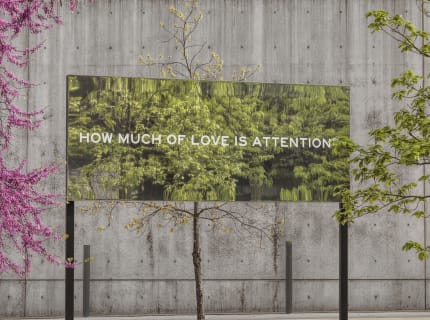Chloë Bass's one-person exhibition Soft Services at the Henry Art Gallery, University of Washington, Seattle, WA.
The institutions press release follows:
Chloë Bass (b. 1984, New York) is a multiform conceptual artist based in New York and St. Louis. Her work in performance, installation, text, and social practice investigates the potential of daily life as a catalyst for intimacy, scaled from individuals to groups. Originally trained as a theater director and influenced by the avant-garde work of playwright Bertolt Brecht, Bass embraces the idea of alienation: the discomfort that arises from calling attention to structure, and the things that we do without thinking, through naming or pointing.
As Bass states,
“My work evokes the particular state of attention produced by being alone in public: the sudden sense of everything as fascinating, the strange anxiety between feeling invisible and suddenly becoming aware that you are seen.”
For Bass’s project, commissioned and organized by the Henry, a series of fourteen stone benches are placed throughout Seattle’s Volunteer Park with two additional sculptures residing outside the Henry itself. Each bench is engraved with its own inscription—artist-written text that both stands alone and creates a larger meaning across the series of seating—and a silhouetted image applied in light-responsive pigment, which allows the image to shift slightly based on the time of day, weather conditions, and sight lines. The project examines themes of cultivation and wildness, the laws we impose to control human bodies, hierarchy and proximity, and stones as memorials, boundaries, and legislative markers.
Throughout Volunteer Park, installation sites are occupied by a single bench, or in groupings of up to three, creating both individually meditative and social spaces for visitors. The engraved text on each sculpture is in the font Optima, chosen by American designer and sculptor Maya Lin for the Vietnam Veterans Memorial in Washington D.C. This font thereafter became de rigueur for memorial writing, but is also commonly used by contemporary wellness and healthcare brands. Lin’s poignant and controversial remembrance of those killed in the war was unveiled at a time the country was experiencing another epidemic: AIDS. While that moment of memorialization and tragic loss resonates with our current pandemic experience and that of larger global aggression, it also ties to the local histories of Volunteer Park as a site for AIDS activism—ultimately grappling with the ongoing politics of isolation, shame, care, and what binds us in sickness and in health.
The title, Soft Services, is a phrase drawn from the artist’s research and interviews with members of the activist community, in reference to the care efforts made during the height of the AIDS crisis. At the time, the rare opportunity arose to use the Ryan White (CARE Act) monies towards "soft services"—aspects of support deemed assistive but not strictly necessary and as such not covered by traditional healthcare (massage, meal trains, dog walking, etc.) Through this installation, Bass explores the notion of what true care means, what we define as essential versus optional, and who has access to it, questions of heightened importance at this moment of crisis and recovery.
Each sculpture also features the silhouette of a plant. Bass conducted research on local plant-life and the effects of human intervention, deliberately or transitively via environmental effect. The black locust was introduced to Volunteer Park by the Olmsted Brothers when it was designed, and thus not native to the area. The alder is native to the park and still exists within it. While western juniper, according to climate change specialists, will likely be coming to the Pacific Northwest region (thus the park) in the coming years, as Seattle’s climate warms. Each plant also has many medicinal uses and mythological histories that played a part in the artist’s selection.
Chloë Bass: Soft Services is a Henry OffSite project. Through exhibitions and programs, Henry OffSite extends our organizational mission of centering contemporary art and ideas and building dialogue with communities across the region. Integrated with our vision for in-museum programming, these projects are developed in partnership with artists and partner organizations, leveraging art to develop and support meaningful encounters, relationships, and activities beyond the museum's walls. Simultaneously, Henry OffSite provides support for artists whose vision is best fulfilled in sites and formats that resonate with their intentions and broad range of practices.

